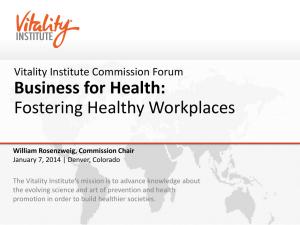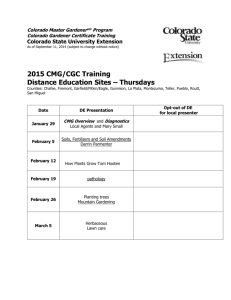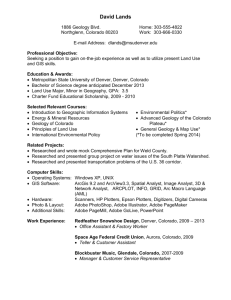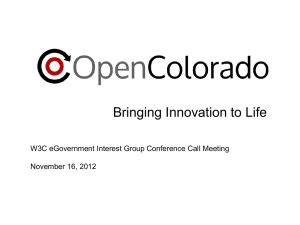Blue Ribbon Commission for Health Care Reform
advertisement
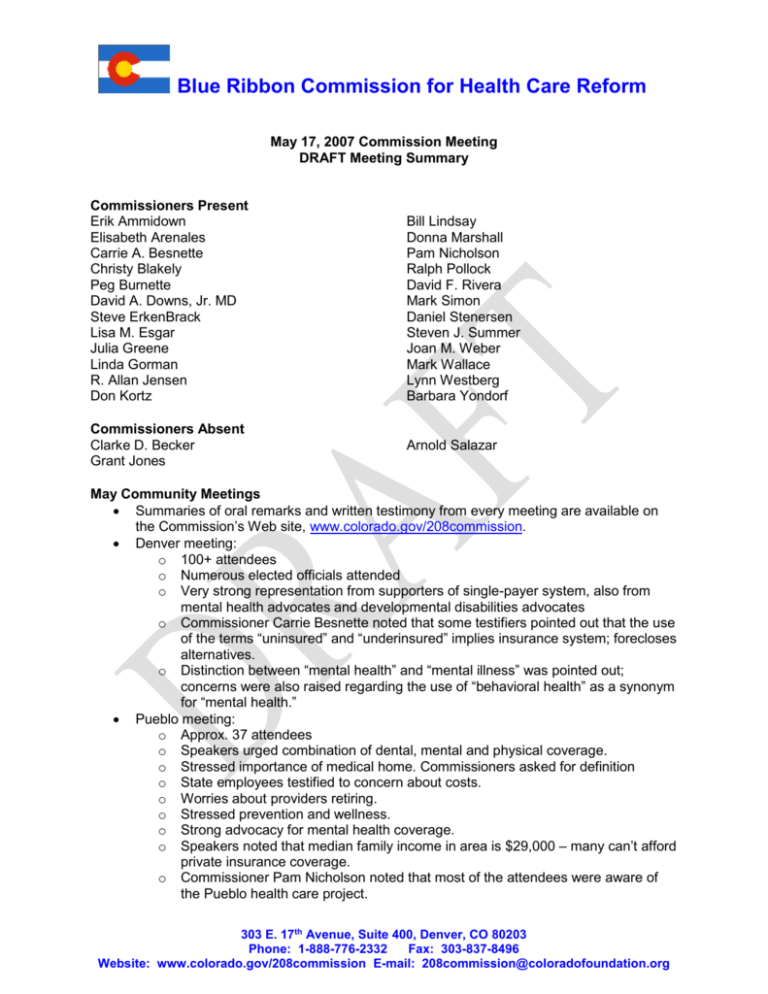
Blue Ribbon Commission for Health Care Reform May 17, 2007 Commission Meeting DRAFT Meeting Summary Commissioners Present Erik Ammidown Elisabeth Arenales Carrie A. Besnette Christy Blakely Peg Burnette David A. Downs, Jr. MD Steve ErkenBrack Lisa M. Esgar Julia Greene Linda Gorman R. Allan Jensen Don Kortz Commissioners Absent Clarke D. Becker Grant Jones Bill Lindsay Donna Marshall Pam Nicholson Ralph Pollock David F. Rivera Mark Simon Daniel Stenersen Steven J. Summer Joan M. Weber Mark Wallace Lynn Westberg Barbara Yondorf Arnold Salazar May Community Meetings Summaries of oral remarks and written testimony from every meeting are available on the Commission’s Web site, www.colorado.gov/208commission. Denver meeting: o 100+ attendees o Numerous elected officials attended o Very strong representation from supporters of single-payer system, also from mental health advocates and developmental disabilities advocates o Commissioner Carrie Besnette noted that some testifiers pointed out that the use of the terms “uninsured” and “underinsured” implies insurance system; forecloses alternatives. o Distinction between “mental health” and “mental illness” was pointed out; concerns were also raised regarding the use of “behavioral health” as a synonym for “mental health.” Pueblo meeting: o Approx. 37 attendees o Speakers urged combination of dental, mental and physical coverage. o Stressed importance of medical home. Commissioners asked for definition o State employees testified to concern about costs. o Worries about providers retiring. o Stressed prevention and wellness. o Strong advocacy for mental health coverage. o Speakers noted that median family income in area is $29,000 – many can’t afford private insurance coverage. o Commissioner Pam Nicholson noted that most of the attendees were aware of the Pueblo health care project. 303 E. 17th Avenue, Suite 400, Denver, CO 80203 Phone: 1-888-776-2332 Fax: 303-837-8496 Website: www.colorado.gov/208commission E-mail: 208commission@coloradofoundation.org Blue Ribbon Commission for Health Care Reform Fort Collins meeting: o Approx. 75 attendees o Many elected officials o Many physicians and nurses o At least two advocates for free-market approach o Strong advocacy for single-payer Many advocates for universal access – not necessarily tied to singlepayer o Focus on prevention and wellness o Need for primary care as centerpiece o Strong focus on mental health o Concerns re: insurance as a business Durango meeting: o Approx. 70 attendees o Overwhelming focus on access – 7-10,000 residents of county don’t have physician Loss of Medicare primary care providers – concerns re: federal prohibition on balance-billing Financial sustainability of providers is problematic – physicians testified to missing paychecks, can’t afford to take more patients Suggestion to use advanced-practice nurses to expand access, use alternative practitioners ways to deliver care Point that insurance does not equal access – most of the people at the meeting had insurance, just couldn’t get physician o Concerns re: system that is procedure-driven, not patient-driven – drives physicians to poor care o Testimony from person who had negative experience with Canadian system o Importance of hospice care o Commissioner Steven Summers noted that providers in border communities who treat patients from outside the state will be affected by statewide reform – e.g., payment systems for Colorado patients that differ from those in surrounding states Glenwood meeting: o 13 attendees o Diverse array – state employee, home health, senior consumer, city HR director, benefits consultant, behavioral health provider, etc. o Testimony re: coverage problems for state employees – note that Colorado is at the bottom in terms of coverage for state employees, 15% are uninsured. o Colorado would have to spend 60 times more on mental health, as compared to its spending on corrections, to get to national average Substance abuse is a particular problem there o Insurance does not equal access o Access to dental providers is a particular problem in that part of the state o 1 speaker said “no single payer” o Don’t forget long-term care 303 E. 17th Avenue, Suite 400, Denver, CO 80203 Phone: 1-888-776-2332 Fax: 303-837-8496 Website: www.colorado.gov/208commission E-mail: 208commission@coloradofoundation.org Blue Ribbon Commission for Health Care Reform Commission Business Upcoming Stages of Work Proposals Committee will meet June 1 and 11 to develop a process for developing a consolidated proposal, should the Commission choose to do so. Communications and Outreach Committee will meet in early June discuss the selection process for Task Forces. Mid-July – results of preliminary modeling on proposals. Health Reform Proposals: Discussion and Selection Discussion re: Developing Consolidated Proposal The Office of Legislative and Legal Services has directed the Commission that it may model no more than 5 proposals. That means that, if the Commission wishes to leave itself the option of developing a consolidated proposal, that proposal could not be modeled unless the Commission chose no more than 4 of the submitted proposals for modeling. Chair Bill Lindsay called for a vote on whether to pursue the idea of developing a consolidated proposal. The Commission voted unanimously to do so. Process Chair Lindsay urged the Commissioners to choose a variety of proposals for modeling that reflect a range of philosophies and approaches. He noted the importance of the modeling process for identifying the “best” proposal. Modeling a range of proposals makes the end result more informative and help the Commission determine the most appropriate and viable approach to submit to the General Assembly. o Discussion ensued about the virtues of choosing a range of approaches or the best” approaches to model. o Commissioner Gorman noted that modeling is essentially a “rear-view mirror” process, based on experience elsewhere. Thus, it can be less useful for analyzing radical departures. o Commissioners noted the value of taking time to explore and learn about strategies and principles separate from the proposals – a global discussion of mandates, connectors, etc. o Governor Ritter has asked the Commission to submit only one proposal to the legislature. Commissioner Summers noted the value of tying any and all recommendations to the General Assembly to the principles adopted by the Commission. o Commissioner Simon noted the importance of honoring the spectrum and diversity of viewpoints among Coloradans. He asked facilitator Chris Adams to keep a running “parking lot” of ideas throughout the selection process that could inform the development of a consolidated proposal. He also asked commissioners to focus on the innovative and positive in what is presented to them Finally, he noted the importance of having substantive discussions about each proposal under consideration. He urged commissioners to question each other to better understand their thinking but not to challenge their colleagues. 303 E. 17th Avenue, Suite 400, Denver, CO 80203 Phone: 1-888-776-2332 Fax: 303-837-8496 Website: www.colorado.gov/208commission E-mail: 208commission@coloradofoundation.org Blue Ribbon Commission for Health Care Reform Agreed-Upon Goals for Today 4 proposals Range of approaches reflected in those 4 Discussion of Proposals Proposals were grouped according to common characteristics. Each proposal was discussed separately. Commissioners identified elements they liked and elements that concerned them. The former are noted in the “parking lot” for each proposal. NOTE: In the course of the discussions, some broad themes/concepts emerged that were not always connected specifically to one proposal but which commissioners wanted to retain for consideration in the development of a consolidated proposal. Those concepts are listed at the end of this document. Group G: Eliminate benefit mandates and business-group-of-one; replace Medicaid with vouchers and Health Opportunity Accounts; require Medicaid agency to compete with private charities for state tax dollars; provide new options for Medicaid long-term care. FAIR Health Care (Proposal 21) Discussion: Based on Florida model of Medicaid reform; that hasn’t worked well, Medicaid HMOs cycle in and out How does redirecting Medicaid $$ to private agencies improve efficiencies? o Private-sector agencies can get things done faster and cheaper, not as bound by regulation (e.g., formulary restrictions, etc.). How would it affect Medicaid-eligible individuals as well as taxpayers? Do taxpayers direct money to specific charities? If one nonprofit gets the lion’s share of the $$, would they provide the lion’s share of the services? o Unclear. Proposal implies that money will go to agencies that provide Medicaidlike services; not sure what those are. o Note that, pre-Medicaid, community/religious charities provided services and people donated to them. May not be reflected in today’s context. o Plan allows Medicaid to compete – sets up tax deduction that allows taxpayers to support nonprofit agencies, does not require taxpayers to do so. o Example of public/private competition for Voc Rehab services – competition has not made the state agency more efficient. o Concerns re: uniformity of criteria and services, accountability of dollars. o Half Medicaid $$ comes from federal government – we could lose it under this plan. Medicaid vouchers been tried elsewhere, haven’t worked – private carriers don’t want to participate. Good elements re: private sector – BG1 changes to minimize adverse selection. o Do away with mandates, costs will drop, take-up rate will increase. Interesting concept. Challenge of free riders – people who do not take personal responsibility (i.e. buy insurance), then we pay for it when they go to ER. 303 E. 17th Avenue, Suite 400, Denver, CO 80203 Phone: 1-888-776-2332 Fax: 303-837-8496 Website: www.colorado.gov/208commission E-mail: 208commission@coloradofoundation.org Blue Ribbon Commission for Health Care Reform Cost-sharing for managing utilization – for low-income individuals, that equation may result in under-utilization and drive up costs on the back end when people forego preventive care. Many of the things the public has told us they want would be lost if we follow a mandatefree approach. o Insurers won’t cover high-cost services w/o mandates. Research shows you can get same impacts of free coverage from simply offering free physicals. Community rating makes premiums so high that healthy people leave system – that’s what leads to need for individual mandates. Better to extract as much money as you can based on people’s ability to pay. Like home- and community-based services for long-term care. o In other proposals, little discussion of long-term care, no acknowledgment of connection between primary care and acute. Everything comes down to the ER. Want public and private hospitals to be subject to same regulations because costs are same. o EMTALA: may incent over-use of services, but has succeeded in keeping people from dying in streets. Individual risk/responsibility v. shared risk/responsibility – another over-arching issue. o Need to consider whether fair to have young subsidize old, chronically well subsidize chronically ill. Disconnect: people care about cost when they purchase insurance but not when they need care. Unique proposal – but concerns re: practicality. Parking lot: Specific elements commissioners liked, broad concepts for consideration: Charities may be able to do some things more efficiently than government agencies Reduce costs by reducing benefits Use market to get desirable outcomes Cost-sharing related to utilization Consumer-directed care Home-based options for long-term care Cost-sharing, could do on basis of whether services are under/over-utilized – skin in the game is important Remind delegation to work on disparity of tax treatment between individuals and corporations Group A: Provide premium assistance for purchase of private coverage Better Health Care for Colorado (Proposal 2) Discussion: Overall: well-thought-out, some good concepts Concern re: using DSH payments to fund – robbing Peter to pay Paul o Colorado already uses 100% of its DSH payments and Upper Payment Limit to fund care for uninsured 303 E. 17th Avenue, Suite 400, Denver, CO 80203 Phone: 1-888-776-2332 Fax: 303-837-8496 Website: www.colorado.gov/208commission E-mail: 208commission@coloradofoundation.org Blue Ribbon Commission for Health Care Reform o Differing view: value of shifting funding source from government to individuals Contradiction in the proposal: either providers compete on basis of price or you pay “reasonable” rates Confusion about “connector” concept – good concept, but who is eligible for exchange – couldn’t tell how portable the plan really is, how COBRA interfaces o Don’t need to create new mechanism to provide information about insurance, they already exist Benefits cap -- $35,000 for hospital – what happens then? Would hit the cap soon with ER visit o Question may be less the dollar amount than what services are included under that cap If you don’t buy insurance, who pays the bills? Does provider eat the cost? If we expand Medicaid, what happens when federal dollars shrink? What happens to Medicaid asset test? (no proposals address that) Could mesh with Proposals 5, 6 and 9 Like willingness to look beyond simply “fixing” current system – rather, find more efficient ways to provide care to those in Medicaid system Similar to Massachusetts plan with addition of “mini-medical” plans (similar to student health coverage) – but they can’t be sold as “insurance” in Colorado o This plan, like many others, considers capping benefits – bears consideration o Differing view: assumes people can predict future, know what they’ll need. People may not know what they’re getting w/mini-med plan. o Mini-meds have value but get tricky on upper end. Guaranteed issue is problematic Regulatory costs are $25k of housing cost -- this proposal would increase cost of housing Dichotomy between consumer choice and reliance on managed care — mechanism could pre-empt stated goal o Nervous re: bringing back capitation Medical home concept is similar to managed care but better Premium subsidies based on taxable income can be problematic How will the plan stabilize or reduce costs? – need to ask this explicitly of all proposals, have not received complete answer from many proposers Parking lot: Specific elements commissioners liked, broad concepts for consideration: Connector/exchange Long-term care approach Managed care Care coordination Limited benefits Consumer choice and control Attention to veterans health care Wellness/prevention – what is the medical community’s ability to influence personal behaviors? In the consolidated proposal, can we look at public health system reform? 303 E. 17th Avenue, Suite 400, Denver, CO 80203 Phone: 1-888-776-2332 Fax: 303-837-8496 Website: www.colorado.gov/208commission E-mail: 208commission@coloradofoundation.org Blue Ribbon Commission for Health Care Reform Group B: Require all Coloradans to have health insurance, and create new guarantee issue product in individual market Solutions for a Healthy Colorado (Proposal 5) Discussion: Does not include employer coverage mandate but does have individual mandate – creates a potentially troubling dynamic re: economic development o If you mandate individual and that person is looking for job, they’ll be more likely to go to job that offers insurance No enforcement for individual mandate Does include employer contribution mandate – employers can’t control exposure Employer coverage still exists as it does today – what’s new is that individuals are required to have coverage, either job-based or individual o Mandate that individuals have basic coverage package – guaranteed issue for that package Provider reimbursement band 125-150% of Medicare – some providers are outside of that band currently o Concern re: price controls – Medicare doesn’t get its prices right o Payment system is part of the problem – Medicare reimbursement is “fee for piecework” – becomes a cost driver Nutritional sales tax – “candy tax” o California did this, spent months deciding whether dried banana chip was snack food – issue is not so much what kids’ behavior but moms’ behavior Add >1% to premium and it affects <1% of people, eliminate it Disagreement about whether Medicaid managed care has saved Colorado money Med mal reform – we’ve got a pretty good system already State employee health plan exacerbates current cost-shift problem Proposal implies that coverage = access, we have empirical evidence that’s not true Assumption that people over 200% FPL can afford insurance – again, evidence shows that’s not necessarily true Core benefit package sounds a lot like current basic and standard plan, which has not been popular – low penetration o Differing view: current basic and standard plan is not subsidized If you use DSH funds for subsidies, how do you cover care for uninsured who show up at the ER? Parking lot: Specific elements commissioners liked, broad concepts for consideration: Alternative forms of reimbursement Low out-of-pockets costs/co-pays rather than high deductibles Subsidies based on FPL Connector/exchange Information on cost and quality 1%/1% mandate approach Standardization of health information technology 303 E. 17th Avenue, Suite 400, Denver, CO 80203 Phone: 1-888-776-2332 Fax: 303-837-8496 Website: www.colorado.gov/208commission E-mail: 208commission@coloradofoundation.org Blue Ribbon Commission for Health Care Reform A Phased Approach to Achieving Universal Health Coverage in Colorado (Proposal 6) Discussion: First one that acknowledged this will cost a lot of money – realistic, sees things happening in phases Individual mandate, modified community rating, guaranteed issue for high-deductible and $2k package o Payroll deduction o Insurers not required to participate in individual market – concerned about continuing current inequities Primarily focused on expanding coverage for kids – that’s already happening with SB 211, CHP+/Medicaid streamlining, other efforts in motion now – not sure what is new and different here – seems to treat other populations as afterthought Does not address long-term care Requires cost-sharing up to 5% of income – for very low-income people that’s still a large chunk What happens when you go over the cap – who pays Default assignment to Medicaid HMOs has been problematic Can reject high-risk individuals – creates 2-tiered system o Differing view: Recognizes there are 2 broad populations to deal with, those with insurance now and those without Founded on assumption of employer-based coverage – do we want to maintain that? o Health insurance is too important to be left to employers Concern that would have to fill out risk questionnaire – violation of personal liberties Government committee controls benefits Restrictions on ability to switch plans Doesn’t seem much different from status quo Not worth cost of collecting premiums to require $2,000 plan – just get an HAS Problem with phased approach is: how often do you go to citizens and ask for tax increases? Any Willing Provider in rural areas – could be problematic Strict enrollment rules – potentially over-designed Parking lot: Specific elements commissioners liked, broad concepts for consideration: Streamlining CHP+ and Medicaid Starting with kids lets you start with healthiest and cheapest Prevention/wellness Managed care Phased approach Premium assistance Address crowd-out Administrative streamlining Individual incentives to keep up with preventive care Risk adjustment to payers Integrating delivery system with IT, case management Tiering benefit package for under 18s 303 E. 17th Avenue, Suite 400, Denver, CO 80203 Phone: 1-888-776-2332 Fax: 303-837-8496 Website: www.colorado.gov/208commission E-mail: 208commission@coloradofoundation.org Blue Ribbon Commission for Health Care Reform Group C: Require all Coloradans to purchase health insurance in individual market, and eliminate employer purchase of health insurance Comprehensive Health Care Plan for Colorado (Proposal 4) Discussion: Mandates purchase of basic coverage in individual market, though some national employers may be exempt 2 tiered approach: o Concern re: haves, have-nots o May be inevitable o Eliminates consumer choice o Discriminates against high-needs populations o If use Oregon-style approach to developing the tiers, it’s a political process So expansive – where do resources come from? Troubling lack of discussion about paying for care of higher-needs people – seems to shift resources from them to less-vulnerable populations What’s basis for identifying cost basis Disagree that we already provide universal care because of EMTALA Concerned re: openness to business mandate – would limit ability of people to start businesses, will create un-business-friendly environment Don’t understand how to model it – punted detail questions to modelers Concern at statement that cost is primary driver of adequacy of benefits Don’t over-rely on health technology – costly for small providers Co-payments for all – don’t assume that just because people are required to pay, they will – evidence shows otherwise Restrictive definition of medical home doesn’t match recent legislation Parking lot: Specific elements commissioners liked, broad concepts for consideration: Tiered coverage concept creative Blurring lines between different market Connector Medical ethics team to discuss prioritization of benefits Flip concept of individual mandate on its head – let legislature talk about how much people will pay, rather than what will be covered Tort reform Simplification, standardization Approach to physician fees Health technology Safety net/medical home discussion based on real experience 303 E. 17th Avenue, Suite 400, Denver, CO 80203 Phone: 1-888-776-2332 Fax: 303-837-8496 Website: www.colorado.gov/208commission E-mail: 208commission@coloradofoundation.org Blue Ribbon Commission for Health Care Reform An Individual-Based Insurance System Combining Free Market Principles with an Appropriate Role for Government (Proposal 9) Discussion: Mandates basic coverage in the individual market Not sure how proposal is feasible given ERISA Fits with many of Commission’s principles Concerns re: coverage for acute care Concern re: Medicaid vouchers Individual mandate but no subsidies – how does someone who loses job continue paying premiums Calls annual health care evaluation “preventive care” – not sure that’s true – in fact, annual physical drives more care and cost – age-specific care is better No proof that pool that covers everyone will make things more affordable Concerns re: affordability What if someone gets subsidy but still doesn’t pay? Concern re: assertion that safety net providers will reduce costs through competition Not sure it addresses core uninsured population problems Concern re: over-reliance on market forces – not sure it’s applicable in rural areas Parking lot: Specific elements commissioners liked, broad concepts for consideration: Like the way it frontloads preventive care and wellness Covering catastrophic care through what’s essentially reinsurance brings down cost of other policies 25% discount for “good behavior” (though that level of discount may not be possible under federal law) Group D: Require all Coloradans to have health insurance, require employers to either cover their employees or pay an assessment, and create new coverage for the uninsured through an expansion of Medicaid and/or creation of a purchasing pool. Connecting Care and Health for Colorado (Proposal 7) Discussion: Potentially v. expensive – may not be sustainable Concerned re: additional regulation and government control Concern re: employer assessment Unclear how you pay for coverage when you’re unemployed Reinsurance has mostly worked on national level – not sure it works at state level Expand CHP+ and Medicaid populations and benefits – federal government unwilling to do that, don’t think funding will be available Concern re: number of agencies that would be created – cost ultimately borne by rate-payer, which is either government or individual Treatment of private insurance market not well developed 303 E. 17th Avenue, Suite 400, Denver, CO 80203 Phone: 1-888-776-2332 Fax: 303-837-8496 Website: www.colorado.gov/208commission E-mail: 208commission@coloradofoundation.org Blue Ribbon Commission for Health Care Reform Parking lot: Specific elements commissioners liked, broad concepts for consideration: Comprehensively covers rural problems/access, regional management of resources Managed care approach Streamlining/expanding HCBS Expanding telemedicine System for comparing provider/facility costs Reinsurance pool could help with sustainability – though not sure if it’s adequately defined, may create a modeling problem o NOTE: Reinsurance doesn’t make costs go away, it reallocates them. Colorado used to have reinsurance pool but insurers didn’t participate. Have to be thoughtful about this issue. Pay for performance – some like, but caution Requirements re: medical loss ratio Good treatment of under-insured Only one to address getting Medicaid SSDI patients back to work Promotes case management Allowing children to stay on parents’ insurance up to age 26 Statewide nurse hotline Integration of community health services Streamlining administrative processes – important for dealing with admin costs Merge individual and small group risk pools o Why not include large groups? From a pooling standpoint, esp. re: reinsurance, would make sense. But can’t include self-insured and some large employers don’t want to pay extra costs. Healthy Colorado Now (Proposal 10) Discussion: Concerned re: using employee withholding to pay for insurance If you go over cap, do insurers eat the costs FQHCs as model creates problems for people with disabilities – most don’t do that well Formulary excludes those with rare or multiple conditions Deny coverage for those benefits w/o proven cost/benefit advantages – results in denying coverage for conditions we’re just learning about Heavy regulatory bent – top-down approach o Concern re: Colorado Health Authority – huge regulatory structure for advice/community input, very complex for what it’s supposed to do o Note: lots of feedback from public that they don’t feel listened to, this is a response to that Pay-or-play model problematic – successful businesses would subsidize less successful ones, would hamper economic development Guaranteed issue – regulatory agency comes up with plan, then insurers only left to offer supplemental benefits – no incentive for them to stay in market o If guaranteed issue, no incentive to buy until you’re sick 303 E. 17th Avenue, Suite 400, Denver, CO 80203 Phone: 1-888-776-2332 Fax: 303-837-8496 Website: www.colorado.gov/208commission E-mail: 208commission@coloradofoundation.org Blue Ribbon Commission for Health Care Reform o Note: Plan requires default enrollment for those who do not choose coverage on their own Acknowledge high up-front costs of implementation Definition of “resident” is very expansive Less disruptive to marketplace than some other approaches Individual mandates eliminate problem of adverse selection and free riders Notion of “fair share” – both individuals and employers should bear some responsibility Pro-CO acts as insurer – problematic Parking lot: Specific elements commissioners liked, broad concepts for consideration: Like incentives for self-managing care, but what do you do for those who can’t? Treatment of provider reimbursement Approach to preventive care Pro-CO is voluntary system that people can choose to migrate to – could set platform for larger pooling of risk and consolidation of delivery system over time Uniform standards for care using Colorado Clinical Guidelines Encourage reimbursement for e-mail/phone consults Administrative simplification Approach to dealing with provider shortages Wellness/prevention approach using public health department Opportunities to connect consumer into system Group E: Require all Coloradans to have health insurance, require employers to either cover their employees or pay an assessment, and replace existing insurance markets with purchasing pool Community of Caring (Proposal 11) Discussion, concerns Strong focus on prevention and patient education No mention of long-term care issues Who pays during periods of extended unemployment Concern re: auto-enrollment No teeth to mechanism to enforce individual mandate Need to consider how to expand access to specialty care Concern re: workability – sounds like this group would purchase all the insurance for the state -- not sure insurers would want to participate o Similar to health care purchasing cooperatives that were floated in 1990s, Federal Employee Health Benefit Plan If we model this, need to clarify premium levels and out-of-pocket expenses Similar to “private sector single-payer” – this has true portability 303 E. 17th Avenue, Suite 400, Denver, CO 80203 Phone: 1-888-776-2332 Fax: 303-837-8496 Website: www.colorado.gov/208commission E-mail: 208commission@coloradofoundation.org Blue Ribbon Commission for Health Care Reform Parking lot: Specific elements commissioners liked, broad concepts for consideration: Prevention Safety net stabilization – understanding that they know how to serve vulnerable populations – broader definition of safety net Emphasis on quality, use of technology to address that Big pool Connector/exchange Incentives for efficiency Local innovation to solve problems Addresses some of the administrative inefficiencies A Plan for Covering Coloradans (Proposal 12) Discussion, concerns Realistic, thoughtful approach – appreciated detail Individual mandate phased in over 2 years – what happens before it’s fully phased in? o Not sure you can fund system when you start with low-income people Doesn’t address long-term care Doesn’t address choice between pool and employer-sponsored insurance Don’t understand how they would get provider price info Concerns re: trying to shape schools, neighborhoods (e.g., market in every neighborhood) Concern re: default enrollment in managed care Parking lot: Specific elements commissioners liked, broad concepts for consideration: Very thorough, well-thought-out Of the proposals with an individual mandate, think this has best enforcement mechanism (tied to state income tax filing) Restructures system to ensure quality, safety and affordability Medically needy program 24/7 nurse line Treatment of COBRA coverage Tier providers based on quality Premium collection process Advanced directives – require execution Connector Benefits stable – won’t change during economic downturn Evidence-based limits on hospital stays and tests Includes state employees Acknowledges that high-needs populations cost more money, have to deal with that Promotes better care delivery training for providers – culturally competent care is v. important Removes disincentive for hiring people with high medical needs Addresses increasing costs as you move along continuum, e.g., from preventive through primary through specialty through long-term care 303 E. 17th Avenue, Suite 400, Denver, CO 80203 Phone: 1-888-776-2332 Fax: 303-837-8496 Website: www.colorado.gov/208commission E-mail: 208commission@coloradofoundation.org Blue Ribbon Commission for Health Care Reform Group F: Create a single, publicly-financed program for integration of financing, delivery and administration of health care Colorado Health Services Program (Proposal 16) Discussion, concerns Bold approach One statewide reimbursement schedule – would be same for all providers. Might prefer to distinguish on basis of performance, volume, specialty care as well as regional cost differentials for providing care. o Note: Idea is actually to get providers to compete on basis of quality Insulated from legislature and state budget – yet uses state dollars as funding source Tax-based or premium-based: 2 different approaches, probably have to pick 1 for modeling o At least offered financing ideas No accountability Parking lot: Specific elements commissioners liked, broad concepts for consideration: Medical home Public utility model – equitable approach to all consumers Reduce premiums for patients who demonstrate compliance with healthy lifestyles Long-term care – though phase-in may be problematic Sin taxes – pros and cons of the idea for financing, but does affect health Treatment of workers comp Additional themes/concepts/issues for consideration Tax treatment of benefits Affordability How will each proposal reduce costs? Most don’t answer it well Wellness and prevention – both approach and definition (access? Or lifestyles?) How do they address statewide coverage, esp. in rural areas Limiting benefits Definition of medical home Need to know which can be implemented quickly, which require federal approval, state constitutional change, etc. 303 E. 17th Avenue, Suite 400, Denver, CO 80203 Phone: 1-888-776-2332 Fax: 303-837-8496 Website: www.colorado.gov/208commission E-mail: 208commission@coloradofoundation.org Blue Ribbon Commission for Health Care Reform Next Steps Reconvene Friday morning, 8 a.m., Mile High United Way. Overnight, commissioners are asked to think about: Broad categories/approaches: Use Commission’s principles and criteria to think about proposals. Proposals themselves: Tease out distinguishing characteristics. What would be helpful for us to evaluate/model? Commissioners requested the following information be posted at Friday’s meeting for them to consider during their deliberations: Overview of characteristics of Colorado’s uninsured population Commission’s criteria Commission’s principles ### 303 E. 17th Avenue, Suite 400, Denver, CO 80203 Phone: 1-888-776-2332 Fax: 303-837-8496 Website: www.colorado.gov/208commission E-mail: 208commission@coloradofoundation.org

